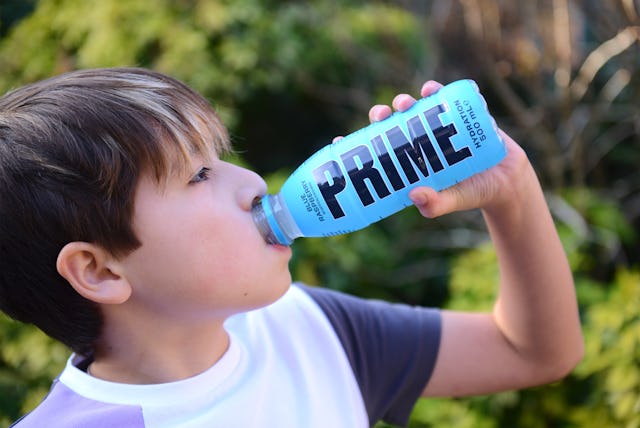Schools Are Banning This Popular Energy Drink With Twice The Caffeine Of Red Bull
Prime Energy is packed with 200 mg of caffeine.

A trendy, new energy drink has already started to become contrabrand in schools after staff realized the dangerous amounts of caffeine in the drink that now has a crazed-fan following.
Prime Energy — first launched in the UK — contains more caffeine than most energy drinks. Now, the drink, which contains 200 mg of caffeine, has become a popular beverage for young kids and teens in the U.S.
The sought-after drink started as a collaboration between controversial YouTuber, Logan Paul, and boxer, KSI.
Packed with 200 mg of caffeine and 300 mg of electrolytes, Prime Energy — which markets itself as a “hydration drink” — contains zero sugar and only 10 calories thus making it a bit of an outlier from other energy drinks on the market like Red Bull or Monster.
Prime’s official website describes it as a “naturally flavored” beverage containing 10% coconut water, antioxidants and electrolytes.
Not only do these other drinks lack the amount of caffeine that Prime punches (Red Bull and Monster have between 86 and 111 mg of caffeine), but they have spokesmen that kids (for some reason) adore.
Collectively, Paul and KSI have over 100 million followers, which according to experts, can create a cult-like following that has Prime Energy users chomping at the bit to get their hands on the drink.
“It actually has zero to do with the product. It’s about the community and the cult that they’ve built,” Amanda Russell, a professor and director of the Global Center for Influence at University of Texas, shared with The Washington Post.
Last December, several videos on TikTok went viral showcasing hundreds of UK residents, waiting in lines and shoving each other in crowds to get to the drink stocked on grocery store shelves.
Sussex Live reported that Crawley’s Aldi sold out of the drink in less than 30 minutes after the store opened at 8 AM. Less than an hour later, Aldi’s management displayed signs outside the store informing customers that all Prime stock had been sold out.
While Prime Energy doesn’t explicitly market their beverage to young consumers, that sure seems to be the age range that cannot seem to get enough of the drink. This could also be attributed to Paul’s audience demographic which is made up considerably of tweens and teens.
Prime warns on their website that the drink “is not recommended for children under the age of 18, women who are pregnant or nursing, or individuals who are sensitive to caffeine.”
A 2018 study noted that excessive caffeine intake by adolescents has been associated with a number of health effects such as “nervousness, irritability, nausea, cardiovascular symptoms, sleep impairment, osteoporosis, and gastric ulcers.”
Teens who did not consume caffeine or had low caffeine intake had better nutritional knowledge related to bone and sleep health, and better dietary behavior related to sleep health, compared with the high caffeine intake group.
Another study found that high energy drink consumption in youth attributed to everything from mild sleep disturbances to death. “There is substantial evidence to suggest that the risk energy drinks pose to health are incredibly hazardous and should not be consumed by children and adolescents,” Lyndsey D. Ruiz, BS and Rachel E. Scherr, PhD wrote in the study.
Dr. Steven Aks, Emergency Department physician and Director of Medical Toxicology at Cook County Health, does not recommend caffeine consumption in minors at all.
“Society encourages and markets energy drinks as a solution for fatigue, but that is not a healthy substitute for the benefits that come from a good night’s rest, having a well-balanced diet, and being physically active - especially for teens,” he tells Scary Mommy.
“Excessive caffeine can cause serious heart complications, anxiety, insomnia (thus worsening fatigue) and dehydration.”
Aks also tells Scary Mommy that parents should start a dialogue with their family doctor if their teen shows signs of exhaustion and fatigue even on healthy lifestyle practices.
“If teens feel that they need caffeine to get through their day, and they aren't helped by getting sleep, eating well and exercising, they (or their parents) should talk to their family doctor,” he says.
Prime’s website warnings and actual scientific evidence doesn’t seem to be doing much to stop kids from consuming the controversial energy drink.
In fact, parents are confirming that kids are becoming so obsessed with the drink that schools are banning it due to high caffeine content and kids selling them to each other on school grounds.
One Twitter user wrote, “We had an email warning from my child's school about the dangers of a new craze called Prime Energy drink. Its stronger than Red bull, promoted on social media. Another kid tried to sell it to my child. I've had no choice but report this to school for the sake of them & others.”
Prime co-founder, KSI, got wind of schools working to ban his drink and posted his grievances on Twitter, calling the ban a “blatant wrongdoing.”
“A school had the AUDACITY to ban Prime, leaving their students dehydrated. To counter this blatant wrongdoing, we’ll be sending a truckload of Prime to this school and many other schools. Just retweet this tweet to represent your school to get some Prime,” he wrote.
Super good example to set for kids! Thus, proving the point that these types of drinks (and these types of spokesmen) are not the best for impressionable young kids.
This article was originally published on